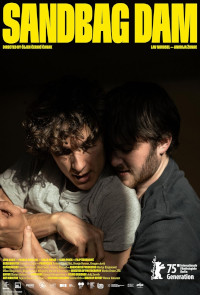| SHADOWS ON THE WALL | REVIEWS | NEWS | FESTIVAL | AWARDS | Q&A | ABOUT | TALKBACK | |||||||||||||
 Shadows off the beaten path Shadows off the beaten pathIndies, foreign, docs and shorts...
On this page:
A FEW FEET AWAY |
THE MOST PRECIOUS OF CARGOES |
SANDBAG DAM
| |||||||||||||
| See also: SHADOWS FILM FESTIVAL | Last update 30.Mar.25 | |||||||||||||
|
A Few Feet Away A Metros de Distancia Review by Rich Cline | 
| |||||||||||||
 dir-scr Tadeo Pestana Caro prd Malena Suarez with Max Suen, Jazmin Carballo, Martin Shanly, Esteban Kukuriczka, Nicolas Rodriguez, Manuel Figuerero, Felipe Romeo, Debora Nishimoto, Luciano Mortarotti, Antonella Fittipaldi, Kevin Havas, Alfonso Badia release UK Mar.25 flare 25/Argentina 1h29  Is it streaming? |
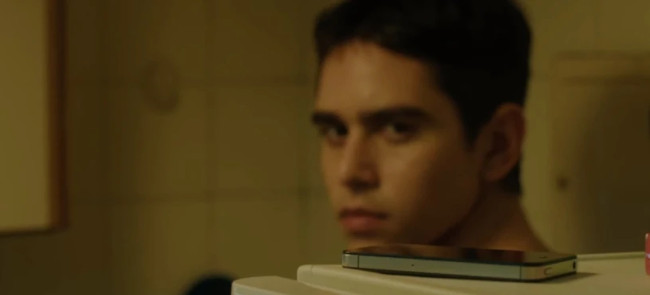 With the tentative energy of a young man who isn't quite sure who he is yet, this Argentine drama has an easy authenticity. It may feel underwritten, but filmmaker Tadeo Pestana Caro has a strong visual style that taps into the characters' attitudes. The editing also feels a bit abrupt, but Caro is unafraid to take the story in some very dark directions. It's an unusually introspective, thoughtful drama. On his lunch break, 20-year-old Santiago (Suen) skips class to meet estate agent Luis (Shanly) in an empty flat. Basically, Santi is always combing hookup apps for someone nearby. An attempt at conventional dating goes badly, leaving him hunting for someone on the wrong side of town. Then he connects with his best friend Karen (Carballo), and they try to work out which of their colleagues has a sexy headless profile on the app. Later, Santi heads to a queer nightclub with a secret sex dungeon. But he's not sure this is his style either. Because the story is told through Santi's eyes, it observes the people around him carefully, looking for clues that might help him work out what he should do next. It's an intriguingly passive approach to storytelling, as Santi tells fantastic stories to the people he meets, including Karen, as he tries to work out what it is that he wants. Essentially he is looking at everything that's available, and he doesn't want to miss anything. Suen is engaging as the rather slippery Santi, who holds his cards close to his chest, adept at spinning tall tales about his exploits. Although encountering these things in the real world throws him. Much of the film features him on his own, working out his next move. His laconic personality is a bit of a challenge for everyone, but he has a strong connection with Carballo's sparkier Karen, who seems to be taking her own journey off-screen. Santi uses the dating app to identify guys wherever he is, which helps him filter them in real life as well. Although this exposes his desperation and vulnerability as a stranger in a strange land. So beneath his bravado, there's a terrified young man who longs for a deeper connection. And even if the film gets very lusty, it remains tightly focussed on Santi's internal voyage of self-discovery, which is still just beginning.
| ||||||||||||
|
The Most Precious of Cargoes La Plus Précieuse des Marchandises Review by Rich Cline | 
| |||||||||||||
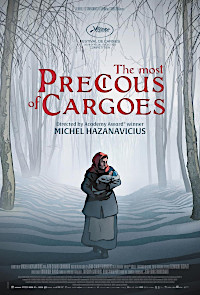 dir Michel Hazanavicius scr Michel Hazanavicius, Jean-Claude Grumberg prd Florence Gastaud, Robert Guediguian, Michel Hazanavicius, Riad Sattouf, Patrick Sobelman voices Dominique Blanc, Gregory Gadebois, Denis Podalydes, Jean-Louis Trintignant, Serge Hazanavicius, Antonin Maurel, Adam Carage, Matej Hofmann, Laurent Bateau, Simon Volodine, Oleg Imbert release Fr 20.Nov.24, UK 4.Apr.25 24/France 1h21 CANNES FILM FEST Is it streaming? |
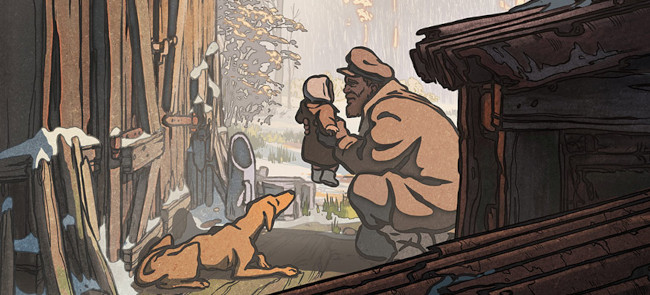 Beautifully animated to mix realistic movement with the visual style of a graphic novel, this is a powerfully involving story set in Poland during World War II. It plays like a fable, exploring human nature and the roots of prejudice and inhumanity. And while filmmaker Michel Hazanavicius skilfully keeps the film warmly enjoyable and often beautifully uplifting, he also refuses to avoid the true horrors of Nazi atrocities. In an isolated cabin, a poor woodcutter (voiced by Gadebois) lives with his patient wife (Blanc), who one night discovers a crying infant thrown into the snow from a passing cargo train. But the woodcutter refuses to have a "heartless" in his house. So the wife moves with the baby into the woodshed, negotiating with a neighbour (Podalydes) for goat milk. She also quietly works on her husband, allowing him to feel the child's heartbeat. This softens him to this giggly girl, and it also sets him at odds with his deeply racist fellow woodcutters. With bold lines and strong colours, the animation feels hand-drawn, tempered by gradients that add remarkable textures through the changing seasons, from the white-out snowstorm to gauzy springtime. The people move with such detail that they seem to have been shot with performance-capture technology. And the tonal shifts further augment the story, with tiny comical moments, dark drama and outright horror when the perspective shifts to the baby's father (Maurel), whose odyssey takes him from the train into the death camp and beyond. This complex approach gives the film an almost startling sense of poetry, as it tells a familiar story through the prism of a fairy tale. Each character is nuanced, most notably the woodcutter, whose journey from thoughtless bigotry to warm compassion unfolds with sympathetic earthiness. His wife is stoic and principled, as is the helpful neighbour, who was disfigured in the earlier war and forced to live apart from society. And then there are the father's haunted eyes, which convey the nightmare of what he experiences and witnesses. In other words, this is not an animated movie for young children, although those able to comprehend the impact of history will be able to see events through powerful new perspectives. Because these harshly racist attitudes swell up even today, it's important that these stories are continually revisited, especially in inventive ways like this. And of course, a lot of grown-ups need to be reminded of these things as well.
| ||||||||||||
|
Sandbag Dam Zečji Nasip Review by Rich Cline | 
BERLIN FILM FEST  Is it streaming?
| 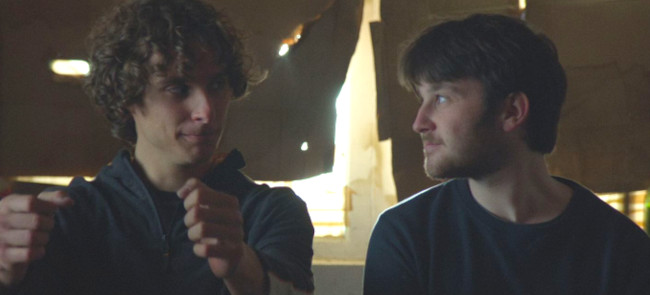 Set in rural Croatia, this relaxed, slice-of-life drama skilfully captures everyday rhythms while focussing on a young gay man at a crossroads in his life. The title refers to sandbags that protect a village from rising river levels, an idea that echoes in how this guy is hiding himself from his family and friends. It's a powerful film that knowingly observes how a society can push people away. In a small town, Marko (Novosel) hangs out with his athletic buddies and his girlfriend Petra (Mikolaci), while also looking out for his cheeky little brother Fico (Grgic). Then his friend Slaven (Zunac) returns to town for his father's funeral. This throws Marko off balance, because there are lingering feelings between them. Marko tries to stay away, determined to make things work with Petra. But he's curious about Slaven's life in Berlin and soon they are rekindling their friendship, including their mutual attraction. Which is actually deeper than either expects. A nice guy, Marko doesn't rise to the rampant machismo that infects most men here, although he holds his own in the arm-wrestling matches that are held regularly as a big competition approaches. Meanwhile, Marko's mum Vanca (Smoje) remembers what happened with Slaven before, and is furious that they're spending time together again. The way she reacted last time was pretty horrible, and she doesn't seem to have softened at all. Understated, naturalistic performances give much of the film an almost documentary vibe, which shifts into emotional drama as the narrative digs deeper into Marko's thoughts and feelings. Novosel has strong on-screen presence, giving Marko a gentle charisma that's very engaging. He also has terrific low-key chemistry with Zunac, who plays Slaven in a slightly more enigmatic way. Their scenes together are intense and emotional. Meanwhile, Novosel also finds strongly likeable rhythms with Grgic particularly, and more prickly ones with Mikolaci and Smoje. Director Cernic Canak maintains a very light touch here, exploring the topic with sensitivity. Along the way, the people of this town come to life in sharply pointed ways, revealing underlying prejudices that are pushing the young people to escape and find a place they can live their own lives. Intriguingly, Marko would prefer to stay here, work with his parents and be himself in this community. But he knows that this won't be possible.
| 
See also: SHADOWS FILM FESTIVAL © 2025 by Rich Cline, Shadows
on the Wall
HOME | REVIEWS | NEWS | FESTIVAL | AWARDS
| Q&A | ABOUT | TALKBACK | | ||||||||||


